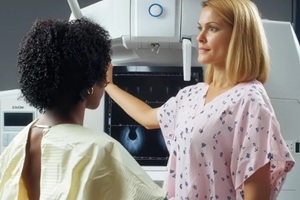 Women’s bodies change frequently throughout life, including breast tissue. While many people assume that these changes do not (or cannot) result in breast cancer until later in life, doctors detect and treat cancers of the breast tissue in young women as well. In fact, among women ages 15 to 39, breast cancer is the most common cancer diagnosis. Breast cancer screening remains an essential medical service for women of all ages. Still, the process may differ depending on age, medical history, and more.
Women’s bodies change frequently throughout life, including breast tissue. While many people assume that these changes do not (or cannot) result in breast cancer until later in life, doctors detect and treat cancers of the breast tissue in young women as well. In fact, among women ages 15 to 39, breast cancer is the most common cancer diagnosis. Breast cancer screening remains an essential medical service for women of all ages. Still, the process may differ depending on age, medical history, and more.
If you are unsure whether you need a mammogram or what the process is for someone your age, one of the best first steps is to get informed.
Here is a basic overview of how breast cancer screenings differ by age, whether you are 20 or 70.
In Your 20s
Most young women in their 20s spend little time thinking about their breast health, but now is the time to begin. Those who have not yet become pregnant are recommended to start annual risk screenings at age 25.
Often, this means discussing breast health with a gynecologist during a yearly well-woman visit. The doctor may also do a manual exam of the breasts, and patients are encouraged to learn how to do their own self-exams at this time.
Women in their 20s who are or have been pregnant should discuss breast cancer risk with a gynecologist earlier than 25 if the pregnancy occurs before then. Hormonal changes can impact the breast tissue, so screening is a valuable tool.
In Your 30s
Once a woman reaches her 30s, she should practice self-exams alongside in-office manual checks. These will make up the bulk of her breast cancer screening habits. However, women who have a family history of breast cancer or who carry the BRCA gene (which increases breast cancer risk) may begin mammography screenings at this point.
Additionally, women in this age range who begin to experience any symptoms of potential breast cancer, such as nipples turning inward, may undergo additional screening, such as a mammogram, to check the cause behind the symptoms.
In Your 40s
For most women, their 40s is their introduction to getting mammograms. Annual screenings become the norm at this stage. However, the type of mammogram will vary depending on geographic location, health history, and more. Some facilities rely on 3D machines, others use 2D imaging, and some use a combination of both.
In between mammograms, continue to conduct self-exams of the breast. In addition, be sure to schedule visits to the gynecologist on the appropriate schedule, where they can also conduct a non-imaging breast exam. With all of these efforts combined, women identify breast cancer incidence more often than if they only rely on self-exams or mammography alone.
In Your 50s and 60s
A woman’s risk of breast cancer tends to increase over time. A woman’s 50s and 60s are when this rise becomes steeper. While around one in 204 women under age 40 will develop breast cancer, as many as one in 28 may face a diagnosis by their 60s.
This makes mammography non-negotiable during this period. Women’s breast tissue becomes less dense as they age, making mammograms more effective in detecting breast cancer. Sometimes follow-up imaging is recommended and while follow-ups do not necessarily indicate an issue, they can confirm (or clear) potential problem areas.
70 Years Old and Beyond
 The highest risk of breast cancer presents from age 70 onwards, with one in 24 women in this age group facing this challenge. However, some medical professionals recommend ceasing mammogram screenings at age 74.
The highest risk of breast cancer presents from age 70 onwards, with one in 24 women in this age group facing this challenge. However, some medical professionals recommend ceasing mammogram screenings at age 74.
Reasons vary and include the increasing potential for overdiagnosis, which may itself pose more risk than the cancer. However, mammograms do continue to locate breast cancer in individuals over the age of 70. Thus, it is essential to consider this decision carefully and discuss it with a medical provider to determine whether breast cancer screening at age 70 onward is the right choice for a specific patient.
Get Screened No Matter Your Age
While breast cancer screenings differ by age, what is most important is that each person takes charge of their health and continues to monitor their breast tissue throughout their lifetime. Whether you are 20 years old or 80, your breast tissue will continue to change.
The professionals at Raleigh Gynecology & Wellness can help you monitor these changes and identify any potentially problematic developments based on a screening regimen that is right for you. Contact Raleigh Gynecology & Wellness to schedule your mammogram!
